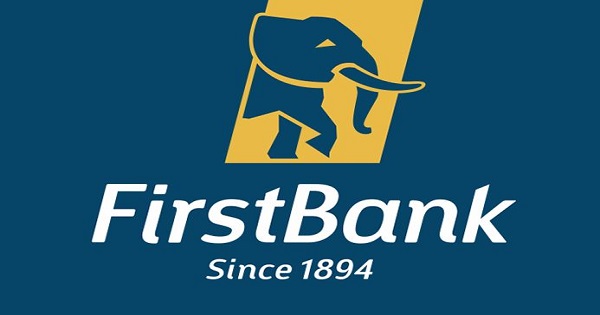E-Financial
How FirstBank is Making Customers Stay-Connected Through Its e-Channels

Folarin is a smart entrepreneur who is in touch with technological advancement and the digital age. He has different apps on his mobile phone which he uses to organise both his business and private lives. He has a food app which he uses to order for his breakfast and lunch, he has another one that takes care of his love for music and another which he uses to manage his transactions online without stepping into a bank. He tells me, his bank is forward looking and futuristic enough to make banking easy for him and his clients.
“I have been banking with FirstBank since I was in school as an undergraduate, says Folarin. My mum opened the account for me. That was where she sent my monthly allowance. After school, I didn’t close the account I simply continued with the tradition.”
It was not difficult for Folarin to decide he would open his corporate account with FirstBank when he started his business a few years ago. He says the ease at which he gets his transactions done on FirstBank’s application, FirstMobile, endears him to the bank.
“I can do many transactions with FirstMobile. I can do bank transfers, check my balance, receive alerts on any transaction I do. There is also a beneficiary section that enables me save the account numbers of people close to me for future transactions.”
The FirstMobile App has over the years offered succour to FirstBank customers.
Folake Ani-Mumuney, Group Head, Marketing & Corporate Communications, FirstBank says “FirstBank wanted a truly branchless experience for its customers and thus enhanced the app to deliver an instant, remote, self-enrolment feature. Hence, in 2015, onboarding process on FirstMobile was improved with self-service feature; empowering customers to remotely complete their onboarding process on the App without visiting a branch.”
In addition, Chuma Ezirim, Group Head, e-Business, First Bank of Nigeria Limited said the soft token was also launched to satisfy the needs of customers who did not want to carry the hard token about. “It serves the same purpose as the hard token but provides the advantage of convenience and mobility as it is installed in the customer’s mobile phone,” he noted.
Another interesting digital service platform by FirstBank is the FirstBillsPay, a biller aggregator platform. It aggregates various billers through a secured connection to the bank, to avail its customers a single payment point for all bills from their accounts.
“In addition to FirstMobile and FirstBillsPay is FirstCheckOut. This is an additional payment option that can be integrated to merchant website that will allow customers pay bills directly from their bank accounts as a substitute to cards. We also have the 894 USSD Quick Banking service as part of our financial inclusion drive. The *894# USSD service makes banking services available across all GSM networks, on any type of device, anywhere and at any time; this gives it a unique selling point,” explained Ezirim.
There are also the Emerging Channels (USSD Collections, mCash, MVISA). These platforms are to ensure FirstBank gets its customers connected in a seamless way in the digital driven age.
“Our FirstBank mVisa is an innovative mobile payment solution that allows consumers to pay for goods and services via FirstMobile by scanning a QR code using a smart phone or by dialing a USSD number on a phone. Payment goes directly from the consumer’s account into the merchant’s account and both parties get real-time notification. The USSD Collections allow merchants to receive payments from customers simply by using 894 USSD string for FirstBank customers. The focus segments for USSD Collections are Manufacturing/FMCGs/ Value Chain Businesses, Petrol Stations, Network Marketing Companies, Transporting Companies, Churches, Schools and others,” says Ezirim.
Furthermore, FirstBank Agent banking was launched towards the end of 2017. The bank recruited Firstmonie Agents and empowered them to carry out basic financial services within their vicinity. Firstmonie Agents are literally human extensions of almost all the banking activities, they are strategically positioned within communities with large population of unbanked and underbanked individuals. With the large network of Firstmonie Agents spread across the length and breadth of the country, financial inclusion is significantly promoted by FirstBank.
Now, the new kid on the block for FirstBank is the chat banking on WhatsApp. With this, FirstBank’s customers can leverage on the real-time messaging capabilities of the WhatsApp Business solution to check their account balances as well as perform simple banking queries.
“Customers’ expectations are constantly changing and it’s our duty as a customer focused bank to ensure that our customers are provided with the means to carry out banking services through any channel they desire,” says Ezirim. “We are constantly seeking new ways and opportunities to meet customers at their preferred touch points and we understand our customers are actively engaged on WhatsApp.”
With FirstBank chatbanking on WhatsApp, it is not just about staying connected with friends and loved ones, but also keeping in touch with FirstBank anytime and anywhere you are.
E-Financial
CBN, NGX Group Defend Economic Reforms at Nasdaq

In a bid to woo global capital and enhance investor’s confidence, Nigeria’s top financial leaders presented a unified front at a strategic investment forum hosted at the Nasdaq MarketSite in New York.

The event was organised by the Central Bank of Nigeria (CBN) in collaboration with Nigerian Exchange Group (NGX Group), JPMorgan, and the African Private Capital Association (AVCA).
The exclusive gathering brought together leaders from the Nigerian diaspora, global investment institutions, and corporate executives for insightful dialogue on the country’s evolving financial landscape and its readiness to attract global capital for sustainable growth.
Governor of the CBN, Olayemi Cardoso in a fireside chat with Nobel Prize-winning economist Dr. James Robinson, outlined Nigeria’s monetary policy direction, growth prospects, and efforts to deepen its financial markets.
He reaffirmed the CBN’s commitment to disciplined policy management, market-friendly reforms, and enhanced transparency to foster a stable, investor-friendly environment. Cardoso also stressed the importance of strong collaboration between regulators like the CBN and market operators such as NGX Group, describing it as critical to building a resilient financial system and mobilising long-term investments.
Temi Popoola, Group Managing Director/CEO of NGX Group, moderated an engaging discussion on how Nigeria’s reforms are repositioning the country as an increasingly attractive destination for global capital.
“Today’s dialogue marks a pivotal step in reshaping global perceptions of Nigeria’s investment story,” said Popoola. “The candid engagement between policymakers, market operators, and investors reflects the real progress Nigeria is making. NGX Group remains committed to supporting reforms that strengthen market structures, drive innovation, and accelerate economic growth.”
While investors welcomed Nigeria’s reform agenda, they emphasized that sustained confidence will require consistent FX policies, lower transaction costs, reduced regulatory friction, clearer direction on non-oil revenue reforms, an improved ease of doing business, and continued transparency in monetary and fiscal communication.
The forum ended on an optimistic note, with participants expressing strong confidence in Nigeria’s economic prospects and its potential for deeper integration into global financial markets, provided reform momentum continues.
E-Financial
Union Bank Rewards Customers in Save and Win Promo with Motorcycles and Cash Prizes

Union Bank of Nigeria has rewarded another set of customers in the ongoing Save and Win Palli Promo 4 campaign. Six lucky customers each won a brand-new motorcycle, and 120 additional winners won cash prizes.

The third monthly hybrid live draws were transparently conducted at the Bank’s Sabo, Yaba Branch in Lagos under the supervision of relevant regulatory institutions.
For integrity purposes, some of the winners were contacted to congratulate and remind them that the Bank will never call to request or confirm their confidential banking details such as BVN, date of birth, pins, or passwords.
Save & Win Palli Promo 4 is a nationwide campaign designed to reward both new and existing customers with cash prizes and other exciting gifts worth N131,000,000.
This initiative aims to support them in achieving their savings goals while getting rewarded at the same time.
To stand a chance to win, customers can continue to top up their savings in multiples of N10,000 or more and perform a minimum of five transactions a month to increase their chances of winning in the draws. This promo is open to new and existing savings and current account holders.
Prospective customers can download the UnionMobile app on their smartphones to open accounts or walk into any Union Bank branch.
Returning customers can call the 24-hour Contact Centre on 07007007000 or visit any Union Bank branch nationwide to reactivate dormant accounts.
E-Financial
FCMB Group Redefines Corporate Storytelling with The Power Of The Group TVC

For decades, financial institutions have struggled to communicate the depth and breadth of their services in a single, coherent message.

FCMB Group’s latest TVC, The Power Of The Group, masterfully accomplishes this by placing its subsidiaries at the heart of the narrative.
The ad opens with a heated basketball game with a lone basketballer then pans out to the full force of the 5-woman team, subtly introducing the idea of collaboration. As the story unfolds, viewers are taken on a journey across Taraba, Abuja and Lagos States, each symbolising a key aspect of FCMB’s ecosystem.
The imagery of the drummers playing on Mambila Plateau reinforces the brand’s message: success is not achieved in isolation—it’s built through strategic partnerships.
From banking to consumer finance, investment management to investment banking, the TVC seamlessly weaves in elements from all arms of the FCMB Group, making it clear that power lies in collaborative innovative efforts.
The tagline ‘The Power Of The Group’ encapsulates the campaign’s essence, reinforcing the importance of unity in financial empowerment.
The production process was an extensive undertaking, requiring 4 months of production and a team of over 1,000 industry professionals.
The investment, said to run into hundreds of millions, underscores the bank’s commitment to delivering not just a commercial but a landmark campaign that defines its brand for years to come.
As the industry takes note, FCMB Group’s approach could redefine how corporate Nigeria tells its story.

 Telecom2 days ago
Telecom2 days agoMTN Nigeria Takes Broadband Services to the Next Level with FibreX Launch

 News2 days ago
News2 days agoSERAP Files Lawsuit Against NBC Over Ban on Eedris Abdulkareem’s Protest Song Tell Your Papa

 E-Financial2 days ago
E-Financial2 days agoFCMB Group Redefines Corporate Storytelling with The Power Of The Group TVC

 Telecom17 hours ago
Telecom17 hours agoDigital Transformation Remains Africa’s Gateway to Economic Advancement – Adumike

 Telecom17 hours ago
Telecom17 hours agoPAFON 2.0: Experts Discuss Pathways to Boost Financial Inclusion in Nigeria

 E-Financial17 hours ago
E-Financial17 hours agoCBN, NGX Group Defend Economic Reforms at Nasdaq

 General News17 hours ago
General News17 hours agoEFCC Clarifies SCUML Certificate Misuse amid CBEX Ponzi Scheme Scandal

 General News17 hours ago
General News17 hours agoFlashChange Partners Ruth Foundation to Empower Vulnerable Children in Alimosho with Skill Acquisition













